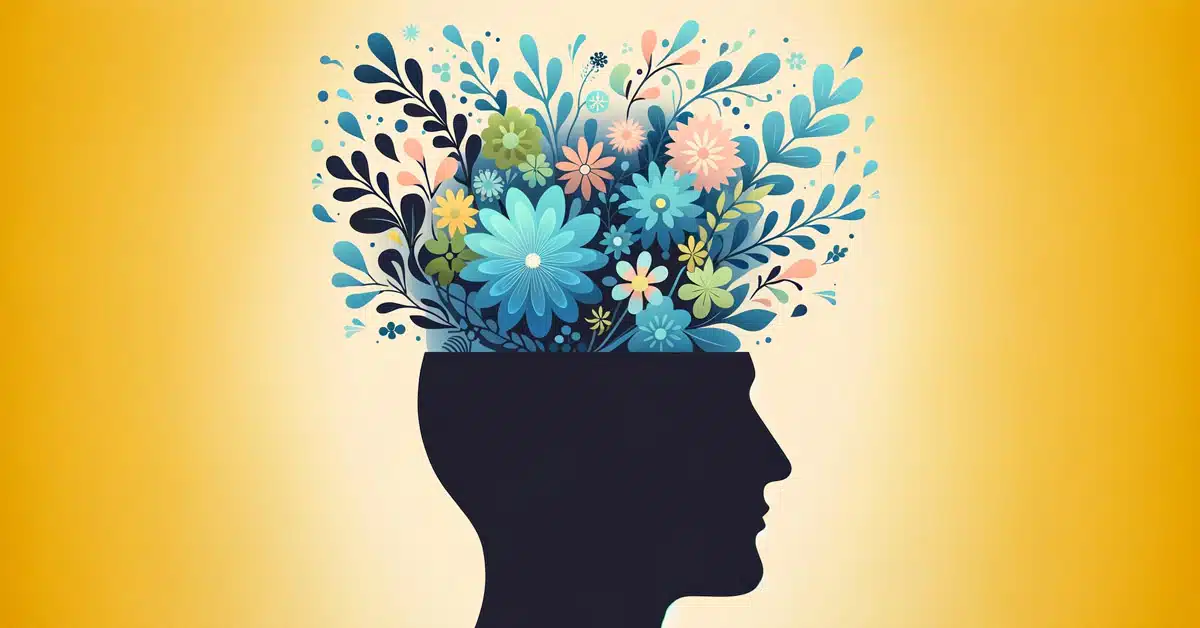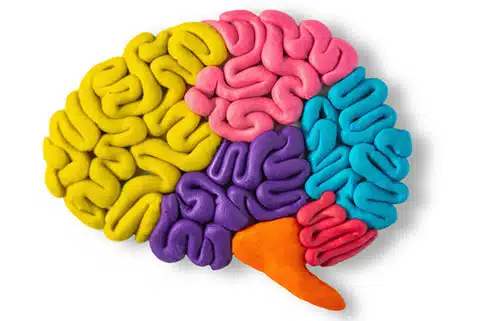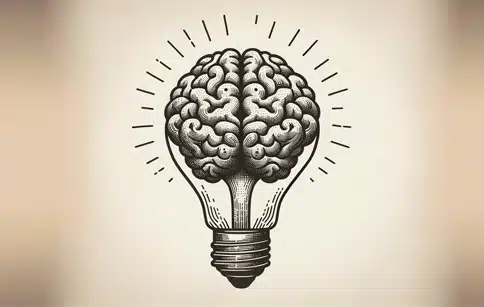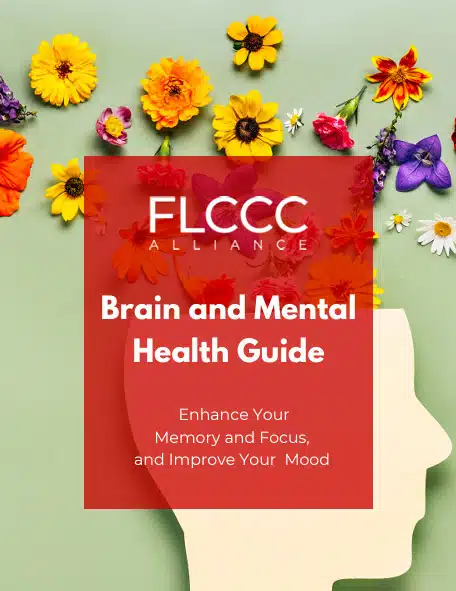Your brain deserves the best! Enhance your memory and focus and improve your mood with FLCCC’s Brain and Mental health guide.

The last few years have been tough on our brains and mental health. With The COVID pandemic, it’s no surprise, right? All the lockdowns and changes… no wonder our wellbeing took a hit. Studies now point out that getting COVID, and even the vaccines, might lead to mental fog and memory issues.
But don’t lose heart. Thanks to the dedicated efforts of the FLCCC and our partners, there’s light at the end of the tunnel. Curious about how to keep your brain sharp and mood up? Check out the guide below. Packed with helpful tips, it’s a solid bet for a mood boost and clearer thinking.
About This Guide
How does the brain affect mental health? Emerging research proves the link is profound. Yet how many psychiatrists would treat a depression patient by looking at inflammation in the brain, for example?
This guide is designed to help you understand and improve your brain and mental health. It covers how to handle common brain diseases like Alzheimer’s and mental health disorders such as depression, significantly impacting global health.
Much of what we cover in the Brain and Mental Health Guide is inspired by two important documents:
- The Depression Monograph: A holistic approach to the treatment of depression
- The Brain Health Protocol: A guide to treating cognitive impairment
Before we continue, if you’re feeling overwhelmed or hopeless, remember urgent help is available through suicide and crisis hotline (in the USA) or by calling 911. You can also find healthcare providers specializing in these issues through the FLCCC website under “Find a Provider.”
Global Impact of Mental Health
Mental disorders and mental health problems affect one-quarter of the global population at some point. These health conditions include:
- Depression
- Anxiety disorders
- Bipolar disorder
- Schizophrenia
- Attention-Deficit/Hyperactivity Disorder (ADHD)
- Obsessive-Compulsive Disorder (OCD)
Depression is an especially significant mental health condition, being a leading cause of disability worldwide. Unfortunately, many young people suffer from mental illness and related issues from an early age, and often, these conditions are not addressed.
Stigma and discrimination are huge barriers preventing people from seeking help. The economic impact is also enormous, costing the global economy trillions annually in lost productivity and healthcare expenses. Despite the prevalence, two-thirds of those affected don’t seek help due to stigma and limited access to care. Online therapy and mobile apps have become valuable resources, providing support that was previously inaccessible.

The Importance of Brain Health
The brain is an incredible multitasker! It controls our thoughts, emotions, memories, and even our heartbeat. Because of its vital role, taking care of the brain is a wise decision for optimal health and overall well-being.
There is a link between the brain and mental illness. Keeping your brain in good health has been shown to improve psychiatric disorders, as well as nervous system disorders like:
- Alzheimer’s Disease
- Parkinson’s Disease
- Multiple Sclerosis (MS)
You have the power to guide your brain’s journey. Each decision you make plants seeds for your brain’s future growth. Adopt brain-boosting habits today and witness your mind thrive in the long run!
Brain Health vs. Mental Health
How does mental health affect the brain? These two areas of study contain much overlap.
The premise is quite simple: how well can we expect our mental health to be if our brain isn’t taken care of? If we neglect our brain health, mental health will suffer as well.
As you’ll see by reading the Brain and Mental Health guide, there are many things you can do to improve brain health. Psychiatric drugs tend to be band-aid solutions and ignore the root cause of illness.
Learn more: Busting Mental Illness Myths
The Gut-Brain Connection
The gut and brain communicate through various pathways, including the vagus nerve, neuroactive compounds from gut bacteria, and the immune system. This two-way communication system ensures that changes in one can impact the other.
To be clear, that means your gut health influences the level of chemicals in the brain!
A significant portion of the body’s serotonin, crucial for mood regulation, is produced in high levels in the gut. Gut bacteria also influence other neurotransmitters like GABA, dopamine, and norepinephrine, affecting mood and anxiety levels.
Chronic inflammation from gut issues is linked to an increased risk of depression and anxiety. The gut microbiome plays a critical role in regulating the body’s immune response and inflammation levels.
What are “Psychobiotics”?
Psychobiotics are probiotics specially designed to improve mental health by influencing communication between the gut and the brain. They target those probiotics that have a positive impact on mental well-being.

Mental Health and the Brain
When it comes to mental health and the brain, there really is a lot you can do without taking any medicine at all.
- Therapy and Lifestyle Adjustments
- Eating for Brain Health
- Supplements for Brain Health
Therapy and Lifestyle Adjustments
To maintain and improve your mental health, it’s crucial to manage your lifestyle actively. This includes checking and balancing vitamin and mineral levels, eating a nutritious diet, reducing sugar intake, fasting for brain health, and regularly engaging in physical activities.
Managing stress through yoga, mindfulness, and outdoor activities is beneficial. Advanced therapies like photobiomodulation and non-invasive brain stimulation can also support brain health.
Learn more: Cognitive Impairment Treatment
Eating for Brain Health
The foods you eat play a significant role in keeping your brain healthy and supporting cognitive functioning. Brain chemistry is incredibly complex. By opting for brain-boosting foods, you’ll be helping yourself no matter what:
- Salmon and other fatty fish rich in Omega-3s
- Broccoli
- Berries
- Dark chocolate
- Eggs
- Coffee
- Green tea
- Avocados
- And many more!
To keep your brain in top shape, avoid foods that can harm your brain health and mental well-being, such as sugary drinks, high sodium snacks, processed meats, refined carbohydrates, trans fats, highly processed foods, and excessive alcohol. These foods can cause inflammation, impact your blood sugar levels, and even harm your heart health.
Learn more: Eat Well Guide
Supplements for Brain Health
Certain supplements can help support brain function:
- Acetyl L-Carnitine: Enhances memory and supports cellular energy.
- Omega-3 Fatty Acids: Reduce inflammation and support brain structure.
- Vitamin D3/K2: Essential for brain development and maintaining brain volume.
- B-Vitamins: Vital for energy production and reducing inflammation in the brain.
- Curcumin and Green Tea: Offer anti-inflammatory benefits and support brain health.
- Magnesium: Forms like magnesium L-threonate are great for brain health.
Ensure you discuss any supplements with your healthcare provider, especially if you are scheduled for surgery, as some supplements can interact with anesthetics.
Conclusion
Our aim is to empower you to take control of your mental and brain health. Remember, the choices you make daily contribute significantly to your mental well-being. Maintain hope, balance your life with self-care, make good nutritional choices, and foster human connections to build a supportive environment. For more detailed guidance, explore the FLCCC resources or contact them for personal support.



